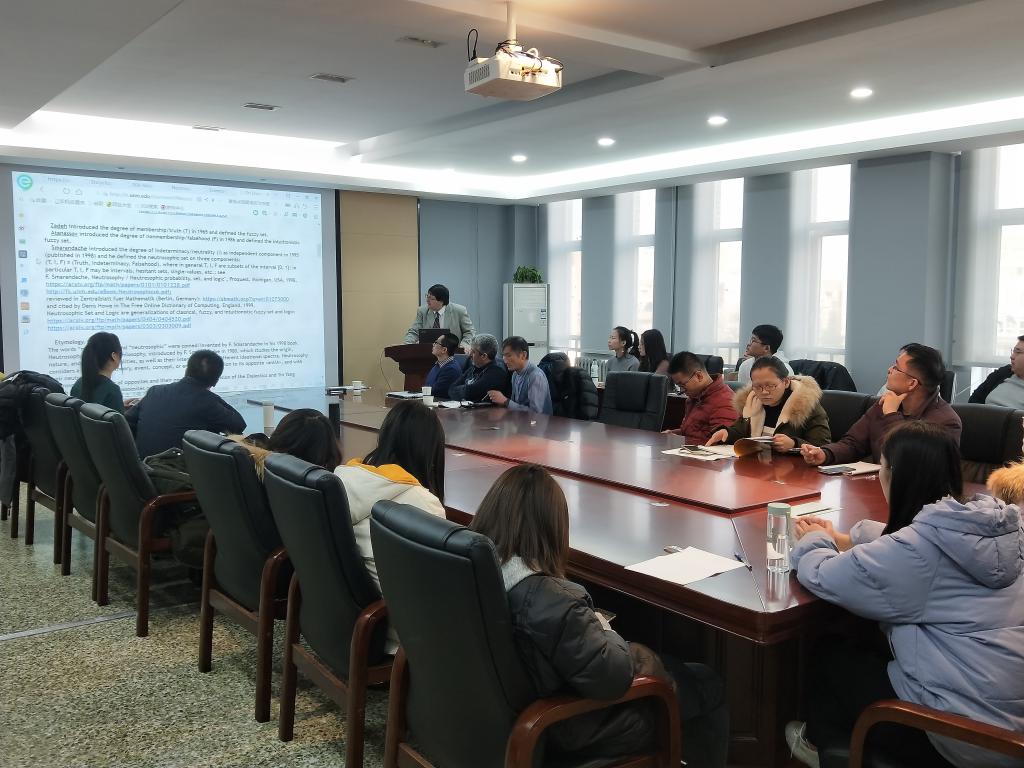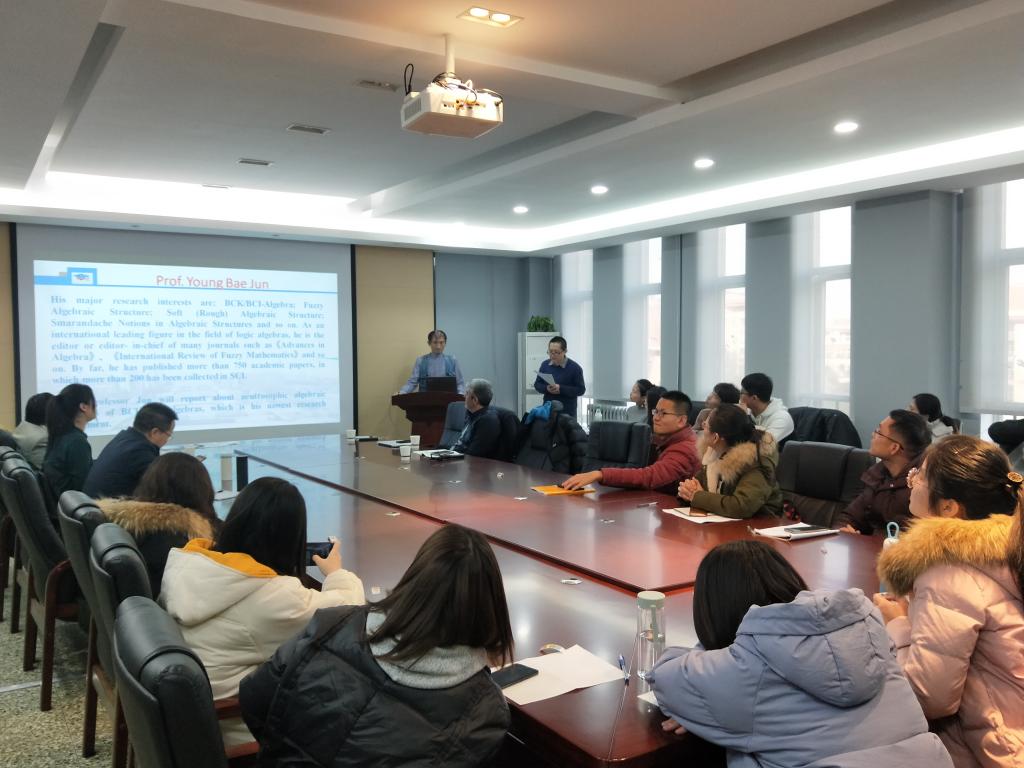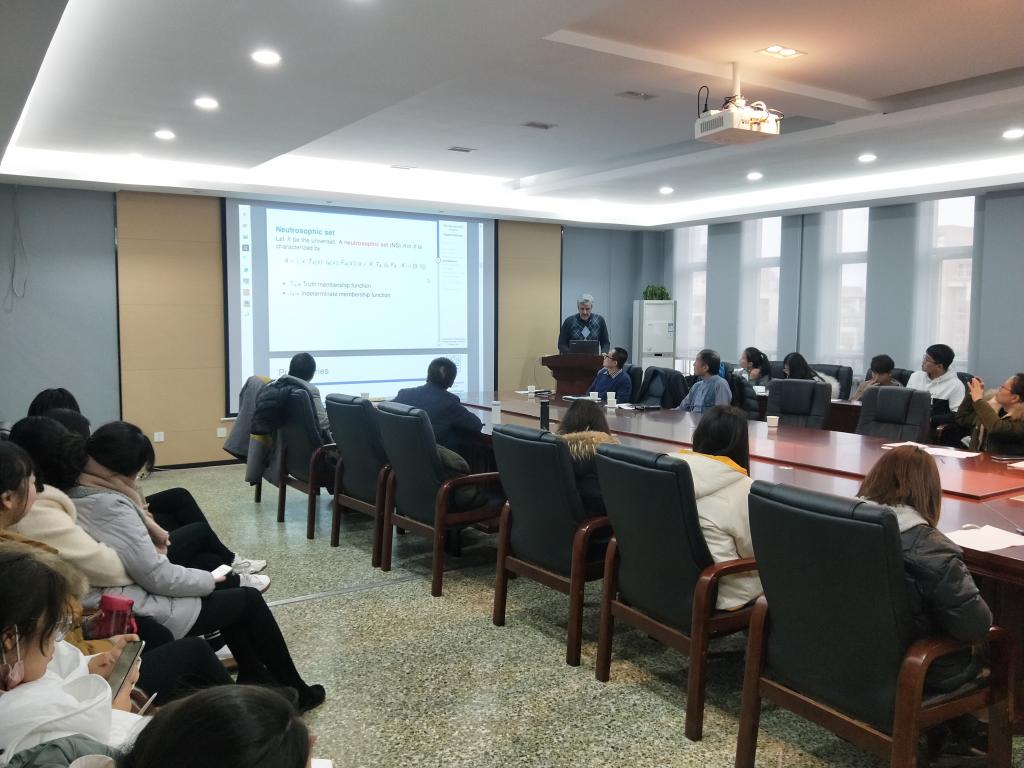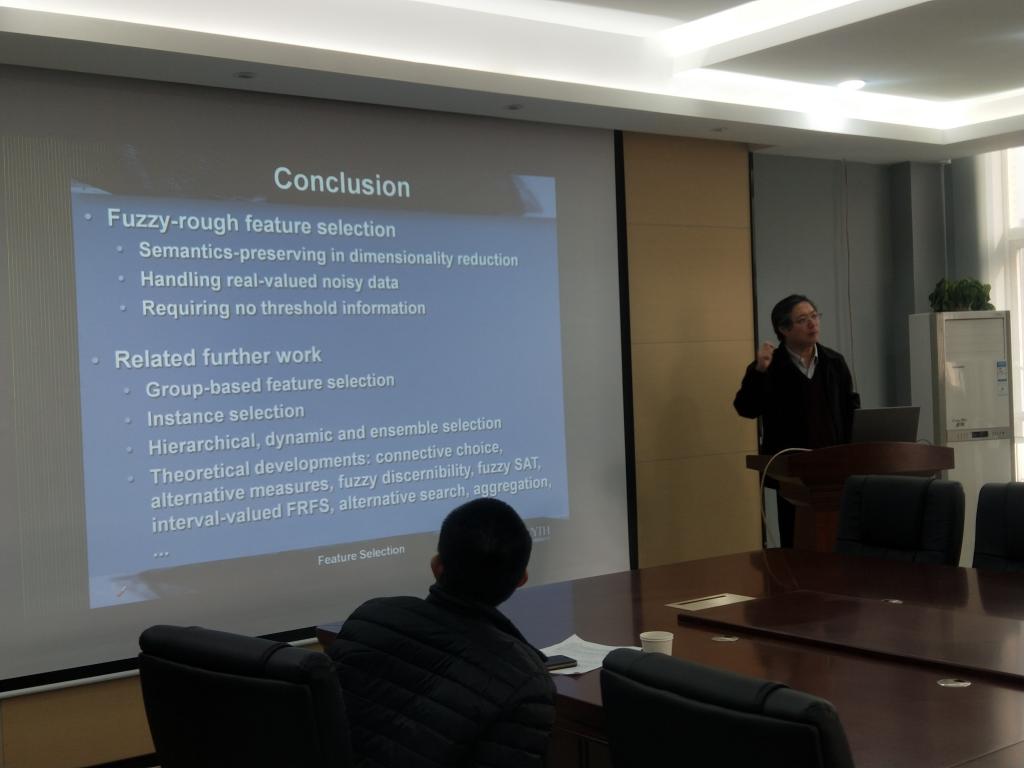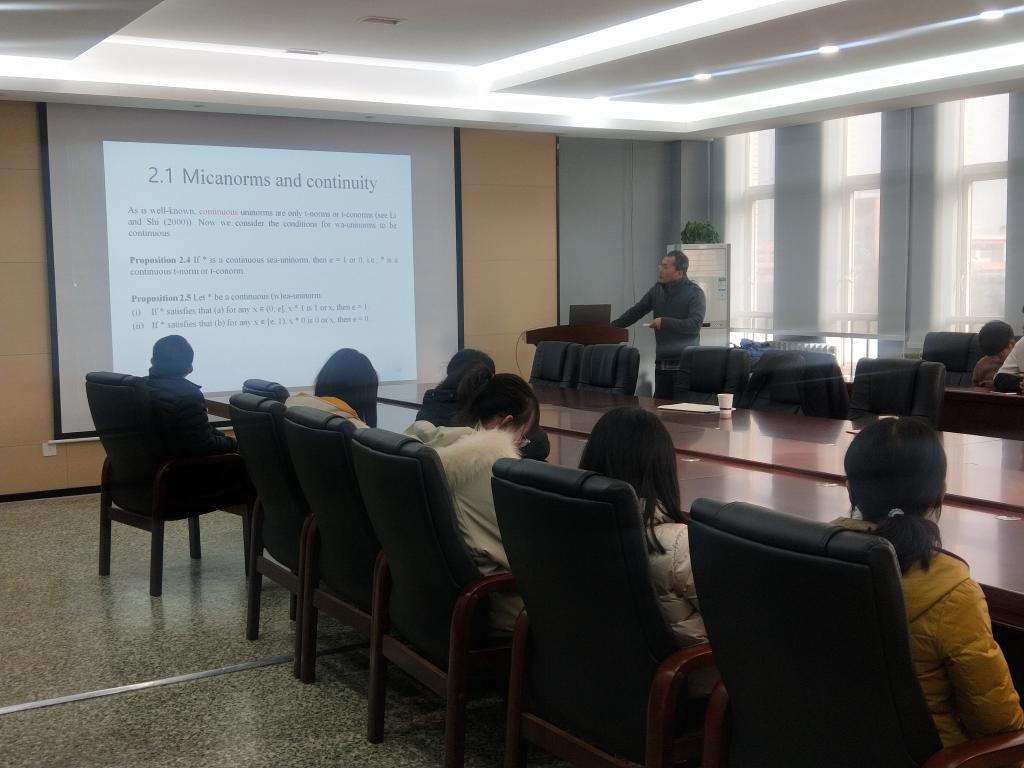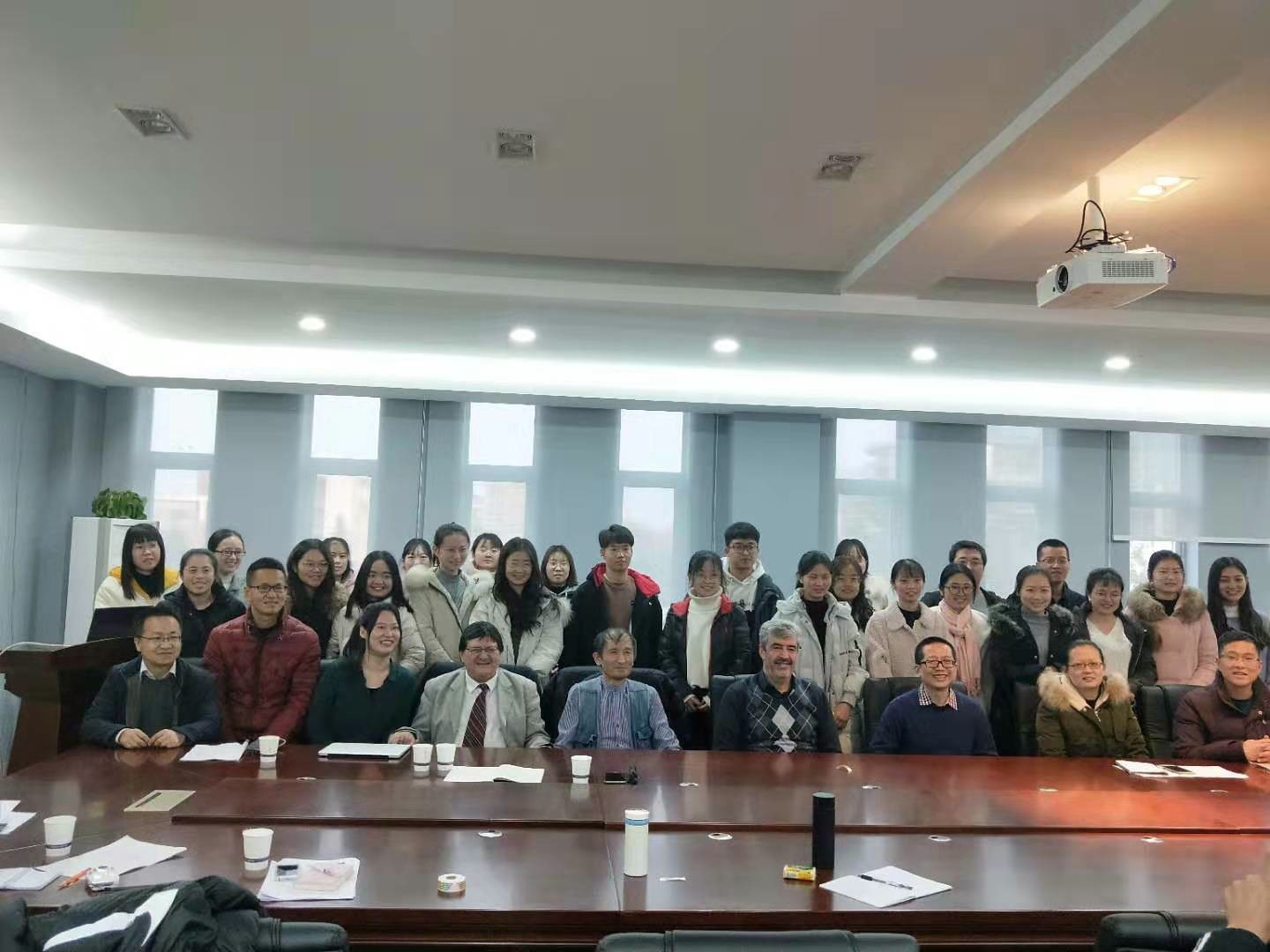理学院开展国际学术交流
为促进国际学术交流与合作,应理学院邀请,2019年12月19日到20日,美国新墨西哥大学的Florentin Smarandache教授、韩国国立庆尚大学的Young Bae Jun教授、伊朗Shahid Beheshti大学的Rajab Ali Borzooei教授、英国Aberystwyth大学的副校长Qiang Shen教授(威尔士科学院院士)和韩国全州全屋国立大学哲学系Eunsuk Yang副教授来理学院做学术报告,报告会在临潼校区理学院楼四层会议室进行,理学院部分教师及数学专业研究生参加了报告会。报告会分两个时段进行,由理学院副院长马盈仓主持。
2019年12月19日下午, 首先,Florentin Smarandache教授做了“On overview of the neutrosophic theories and applications”的报告,介绍了中智理论和应用的发展历史(1995-2019),介绍了中智理论和应用的发展历史(1995-2019)。证明了无论单值中智分量之和小于1、大于1或等于1,中智集都是直觉模糊集的一个推广。证明了Atanassov的第二类直觉模糊集(AIFS2)和球面模糊集(SFS)不存在独立分量。
随后,Young Bae Jun教授做了“Neutrosophic algebraic structures in BCK/BCI-algebras”的报告,考虑把中智集理论应用于一些代数结构,如剩余格,MV-代数,BL-代数,MTL-代数,R0-代数,等式代数,有效代数,EQ代数,格蕴涵代数,BCK/BCI代数,IS-代数,hoop代数等。有几种中智集可以应用于一些代数结构中,如模糊中智集理论,双极模糊中智集理论,直觉模糊中智集理论,区间值中智集理论,多值中智集理论,中智二重态和三重态理论,中智犹豫模糊集理论,中智vague集理论,基于中智点的中智集,中智四重态结构,中智软集和粗糙集理论,中智N-结构,中智超结构,中智伪代数结构,中智立方集理论,广义中智集理论,MBJ中智集理论,多极模糊中智集理论等。这些与中智集理论有关的概念在BCK/BCI代数上进行了详细的讨论。
最后,Rajab Ali Borzooei教授做了“MBJ-neutrosophic graphs”的报告,将MBJ-中智集应用于图论。引入了MBJ中智图的概念,并研究了许多性质。然后定义了MBJ-中智路径、MBJ-中智直径、MBJ-中智完备图、MBJ-中智强图和MBJ-中智图强度的概念,并给出了几个例子来说明这些概念。给出了MBJ-中智桥和MBJ-中智割点的概念,并对其相关性质进行了研究。报告最后,又给出了MBJ-中智图的一个应用。
2019年12月20日上午, 首先,Qiang Shen教授做了“Feature selection in systems modeling with imprecise data”的报告, 集中讨论基于粗糙和模糊粗糙理论的近似FS机构的发展和应用。特别是,模糊粗糙特征选择(FRFS)适用于离散和实值噪声数据(或两者的混合)。FRFS被证明是一种有效的语义保持数据降维技术。在介绍FS的一般背景时,报告首先介绍基于粗糙集的方法,然后重点介绍了FRFS及其在实际问题中的应用。会谈最后又概述进一步发展的机会。Qiang Shen教授更是为了照顾听报告人的接受能力,在中途多次详细解释一些基础理论概念。随后Eunsuk Yang副教授做了《Micanorm aggregation operators》的报告,主要内容是mica范数的基本代数性质。首先回顾mica范数的一般定义,具有结合律三种弱形式的mica范数,以及Lukasiewicz、Goedel和乘积弱e-结合(wea-)单范数。然后介绍了Lukasiewicz,Goedel和乘积t-范数的mica范数类似物,以及这些类似物的一些特征代数性质。
为了让更多的研究人员了解中智集理论,Florentin Smarandache教授为我校图书馆捐赠了一本书和一张包含他的所有著作的CD光盘。作报告的专家学者们幽默风趣,平易近人,他们尽量用浅显易懂的语言展示自己的研究成果,给师生们留下了深刻的印象。报告结束后,作报告的专家学者们还与青年教师进行了座谈,进行了深入交流,分享了自己的科研经历,还给青年教师提了一些做科研以及英语学习上的建议。
此次学术报告会内容丰富,实用性强,受到与会师生的一致认可和好评。青年教师们也表示通过这次学术活动,受到很大启发,对进一步做好科学研究和学术文章的发表都具有非常实际的指导作用。(撰稿:周欣 审核:马盈仓 陈宣)
报告专家简介
1.Florentin Smarandache Graduated from the Department of Mathematics and Computer Science at the University of Craiova in 1979 first of his class graduates, earned a Ph. D. in Mathematics from the State University Moldova at Kishinev in 1997, and continued postdoctoral studies at various American Universities and Research Institutions, such as University of Texas at Austin, University of Phoenix, Arizona State University, New Mexico State University at Las Cruces, Los Alamos National Laboratory etc. after emigration.Heintroduced the degree of negation of an axiom or theorem in geometry, the multi-structure , and multi-space.He generalized the fuzzy, intuitive,paraconsistent, multi-valent,dialetheistlogics to the 'neutrosophiclogic' and, similarly, he generalized the fuzzy set to the 'neutrosophicset' (and its derivatives: 'paraconsistentset', 'intuitionistic set', 'dialethistset', 'paradoxistset', 'tautological set')
Very prolific, he is the author, co-author, editor, and co-editor of 180 books published by about forty publishing houses (such as university and college presses, professional scientific and literary presses, such as SpringerVerlag(in print), Univ. of Kishinev Press, Pima College Press,ZayuPress, Haiku, etc.) in ten countries and in many languages, and 650 scientific articles and notes, and contributed to over 100 literary and 100 scientific journals from around the world,such as:Neural Computing and Applications (Springer), Applied Intelligence (Springer), Fuzzy Sets and Systems (Elsevier),Applied Soft Computing, Journal of Medical Systems,International Journal of Uncertainty, Fuzziness and Knowledge-Based Systems (World Scientific), Bulletin of the Research Institute of Technology.
2.Young Bae JungotPhD from Kyung Hee University, Seoul, South Korea. Post-DoctoralFellow at University of Alberta, Canada, 1989-1990 (Supported by KoreaScience & Engineering Foundation).Heworked at the Department ofMathematics Education, Gyeongsang National University (GNU) as aprofessor (from 1982 to 2016), and now Emeritus Professor of GNU.His research interests: BCK/BCI-Algebra; Fuzzy Algebraic Structure; Soft (Rough) Algebraic Structure; Smarandache Notions in Algebraic Structures.
He published a book, “BCK-algebras”, with Professor J. Meng, and more than766research papers in several journals. Awards and Honors: AcademicAchievement Award (7 July 2006), Busan-Gyeongnam Branch of theKorean Mathematical Society. Listed in the eighth edition of “MarquisWho's Who in Science and Engineering”. Listed among the Highly CitedResearchers 2016 published by Thomson Reuters.Listed at the 2017 and 2018 Highly Cited Researchers which has been published in Clarivate Analytics.
3.Prof. R. A. Borzooei is workingat Department of Mathematics, Shahid Beheshti University, Tehran, Iran. He hasreceived his Ph.D. at University of Kerman. He has published more than 200papers in several journals. His mathematical research areas are algebra ( general algebra,logical algebras),algebraic hyperstructures,fuzzy mathematics, algebraicgraphs and fuzzy graphs.He is working as an (managing) editor of 8journals, such as:
lFrom2002-to date: Managing Editor and Founder: Iranian Journal of Fuzzy Systems(IJFS) (Iran).
lFrom2019-to date: Editor-in-Chief and Founder: Journal of Algebraic Hyperstructures and Logical Algebras(JAHLA) (Iran).
窗体顶端
4.4窗体底端
4.Professor Qiang Shen received a PhD in Knowledge-Based Systems and a DSc in Computational Intelligence. He holds the Established Chair of Computer Science and is a Pro Vice-Chancellor at Aberystwyth University. He is a Fellow of the Learned Society of Wales (aka. the Royal Society of Wales) and a UK Research Excellence Framework (2008-2014 and 2014-2021) panel member (for Computer Science and Informatics), one of the only two overseas Chinese scholars who have been twice appointed to such an important role across all assessment panels. He has been a long-serving Associate Editor or Editorial Board member of many leading international journals (e.g., IEEE Transactions on Cybernetics and IEEE Transactions on Fuzzy Systems), and has chaired and given keynotes at numerous international conferences.
Professor Shen’s current research interests include: computational intelligence, learning and reasoning under uncertainty, pattern recognition, data modelling and analysis, and their applications for intelligent decision support (e.g., space exploration, crime detection, consumer profiling, systems monitoring, and medical diagnosis). He has authored 2 research monographs and approximately 400 peer-reviewed papers, including an award-winning IEEE Outstanding Transactions paper. He has served as the first supervisor of more than 60 PDRAs/PhDs, including one UK Distinguished Dissertation Award winner. Professor Shen is a London 2012 Olympic Torch Relay torchbearer, nominated to carry the Olympic torch in celebration of the centenary of Alan Turing.
窗体顶端
5.Eunsuk Yang received his Ph.D. in Department of Philosophy from Yonsei University in 1997, visited Indiana University (Bloomington), IN, USA, in 2001-2002 as a postdoctoral researcher, and is an Associate Professor of Philosophy Department at Jeonbuk National University, Jeonju, South Korea. His research interests include non-classical logics, in particular, fuzzy logic, substructural logic, relevance logic, and algebraic logic. He has published many articles in journals and conference proceedings in these research areas.
